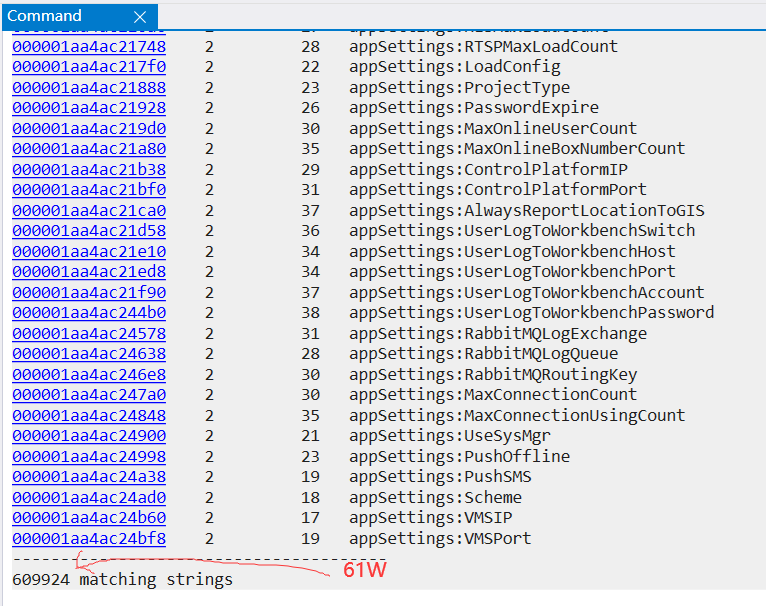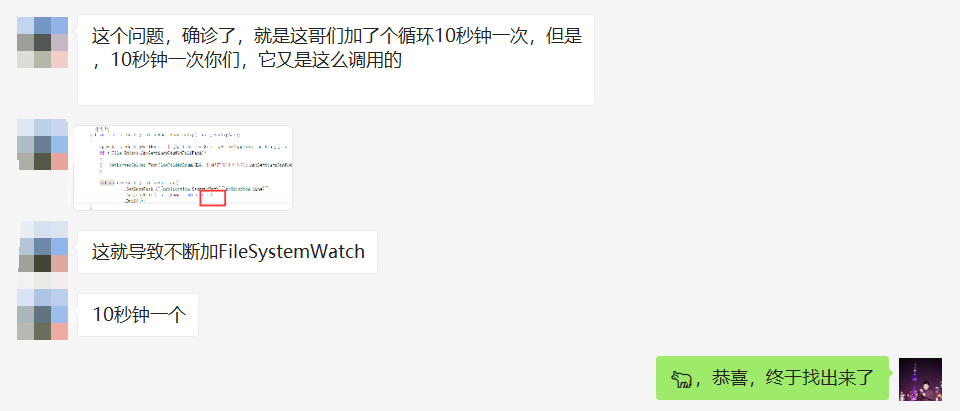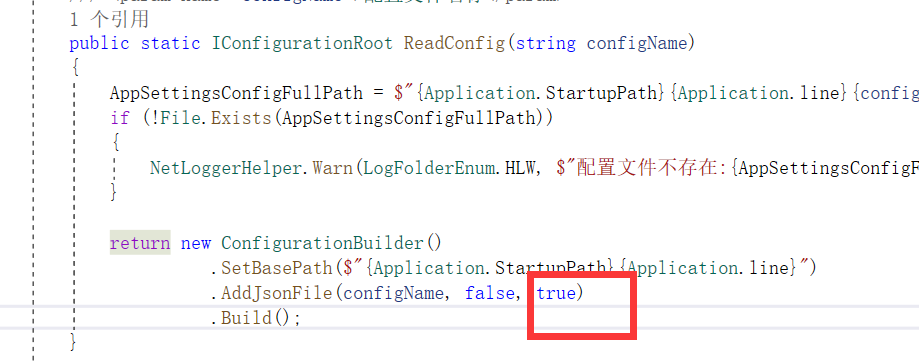一:背景
1. 讲故事
上上周有位朋友找到我,说他的程序CPU和句柄都在不断的增长,无回头趋势,查了好些天也没什么进展,特加wx寻求帮助,截图如下:


看的出来这位朋友也是非常郁闷,出问题还出两个,气人哈,关于 cpu 爆高的问题我准备单独用一篇文章去侦读,这篇就先聊聊 句柄泄漏 的问题,毕竟写了20多篇,也是第一次聊到 handle 泄露,有点意思哈。
2. 什么是句柄
我个人理解的句柄:就是在托管层持有了一个对非托管层资源的引用,有了这个引用,我们就可以强制回收非托管资源,那什么是非托管资源?我个人的理解是 gc 管不到的地方都是 非托管资源。
通常包含这种句柄的类有:FileStream, Socket 等,如果大家有这个前置基础,接下来就可以用 windbg 去分析啦!
二:windbg 分析
1. 看问题表象
朋友从 任务管理器 中看到 handle =8770,那就说明程序中有 8770 个对非托管资源持有句柄,那怎么去看呢? 在说这个之前,大家有没有遇到这种现象,就是不管程序怎么泄漏,只要我们退出exe,那么所有的资源都会被神奇的 释放, 不管是托管资源还是非托管资源,这样说相信有很有朋友好奇这是怎么实现的???大家可以先想 10s。
揭晓答案啦!简单的说, CLR 在内部维护了一张句柄表,当程序关闭时,CLR会强制释放句柄表中的所有句柄,那问题就简单了,既然 CLR 能触达,我相信通过 windbg 也能做到,对,就是通过 !gchandles 命令。
2. 查看句柄表
这里提醒一下,!gchandles 的作用域是 AppDomain,而不是 Process,接下来看一下命令输出:
0:000> !gchandles -stat
Statistics:MT Count TotalSize Class Name
...
00007ffccc1d2360 3 262280 System.Byte[]
00007ffccc116610 72 313224 System.Object[]
00007ffccc3814a0 8246 593712 System.Threading.OverlappedData
Total 10738 objectsHandles:Strong Handles: 312Pinned Handles: 18Async Pinned Handles: 8246Ref Count Handles: 1Weak Long Handles: 2080Weak Short Handles: 59Dependent Handles: 22从输出看,有一组数据特别刺眼,那就是:Async Pinned Handles = 8246 [System.Threading.OverlappedData],这是什么意思呢?从英文名就能看出这是一个和 异步IO 相关的句柄,有些朋友应该知道,在异步IO的过程中,会有一个 byte[] 被 pinned 住,同时还有一个异步IO的上下文对象 OverlappedData。
接下来的一个问题是:既然是异步IO,那它的 handle 是什么类型,如前面所说是 FileStream 还是 Socket ?要想找出答案,就需要深挖 OverlappedData 对象,相关的命令是:!dumpheap -mt xxx & !do ... ,参考如下:
0:000> !DumpHeap /d -mt 00007ffccc3814a0Address MT Size
000001aa2acb39c8 00007ffccc3814a0 72
000001aa2acb3fd8 00007ffccc3814a0 72
000001aa2ad323d0 00007ffccc3814a0 72
...
0:000> !do 000001aa2acb39c8
Name: System.Threading.OverlappedData
MethodTable: 00007ffccc3814a0
EEClass: 00007ffccc37ca18
Size: 72(0x48) bytes
File: C:\xxx\xxx\vms_210819\System.Private.CoreLib.dll
Fields:MT Field Offset Type VT Attr Value Name
00007ffccc21f508 40006b2 8 System.IAsyncResult 0 instance 0000000000000000 _asyncResult
00007ffccc110ae8 40006b3 10 System.Object 0 instance 000001aa2acb4020 _callback
00007ffccc381150 40006b4 18 ...eading.Overlapped 0 instance 000001aa2acb3980 _overlapped
00007ffccc110ae8 40006b5 20 System.Object 0 instance 000001aa2acb9fe8 _userObject
00007ffccc11f130 40006b6 28 PTR 0 instance 000001aa2a9bd830 _pNativeOverlapped
00007ffccc11ecc0 40006b7 30 System.IntPtr 1 instance 0000000000000000 _eventHandle
0:000> !DumpObj /d 000001aa2acb3980
Name: System.Threading.ThreadPoolBoundHandleOverlapped
MethodTable: 00007ffccc3812a0
EEClass: 00007ffccc37c9a0
Size: 72(0x48) bytes
File: C:\xxx\xxx\vms_210819\System.Private.CoreLib.dll
Fields:MT Field Offset Type VT Attr Value Name
00007ffccc3814a0 40006ba 8 ...ng.OverlappedData 0 instance 000001aa2acb39c8 _overlappedData
00007ffccc34fcd0 40006a4 10 ...ompletionCallback 0 instance 000001aa2acb3920 _userCallback
00007ffccc110ae8 40006a5 18 System.Object 0 instance 000001aa2acb38c8 _userState
00007ffccc380120 40006a6 20 ...locatedOverlapped 0 instance 000001aa2acb3960 _preAllocated
00007ffccc11f130 40006a7 30 PTR 0 instance 000001aa2a9bd830 _nativeOverlapped
00007ffccc380eb8 40006a8 28 ...adPoolBoundHandle 0 instance 000001aa2acb3900 _boundHandle
00007ffccc1171c8 40006a9 38 System.Boolean 1 instance 0 _completed
00007ffccc34fcd0 40006a3 458 ...ompletionCallback 0 static 000001aa2acb4020 s_completionCallback
0:000> !DumpObj /d 000001aa2acb3900
Name: System.Threading.ThreadPoolBoundHandle
MethodTable: 00007ffccc380eb8
EEClass: 00007ffccc37c870
Size: 32(0x20) bytes
File: C:\xxx\xxx\vms_210819\System.Private.CoreLib.dll
Fields:MT Field Offset Type VT Attr Value Name
00007ffccc1d76b0 40006a1 8 ...rvices.SafeHandle 0 instance 000001aa2acb1d30 _handle
00007ffccc1171c8 40006a2 10 System.Boolean 1 instance 0 _isDisposed0:000> !DumpObj /d 000001aa2acb1d30
Name: Microsoft.Win32.SafeHandles.SafeFileHandle
MethodTable: 00007ffccc3807c8
EEClass: 00007ffccc37c548
Size: 48(0x30) bytes
File: C:\xxx\xxx\xxx\System.Private.CoreLib.dll
Fields:MT Field Offset Type VT Attr Value Name
00007ffccc11ecc0 4000bb4 8 System.IntPtr 1 instance 0000000000000428 handle
00007ffccc11b1e8 4000bb5 10 System.Int32 1 instance 4 _state
00007ffccc1171c8 4000bb6 14 System.Boolean 1 instance 1 _ownsHandle
00007ffccc1171c8 4000bb7 15 System.Boolean 1 instance 1 _fullyInitialized
00007ffccc2f1ae0 4001c3d 20 ...Private.CoreLib]] 1 instance 000001aa2acb1d50 _isAsync
00007ffccc380eb8 4001c3e 18 ...adPoolBoundHandle 0 instance 0000000000000000 <ThreadPoolBinding>k__BackingField上面倒数第五行的 0000000000000428 就是具体的 handle 值,接下来就可以用 !handle 命令查看其值的具体信息。
0:000> !handle 0000000000000428 7
Handle 428Type FileAttributes 0GrantedAccess 0x100081:SynchRead/List,ReadAttrHandleCount 2PointerCount 65489从 Type:File 可以看出,原来这 8000 多都是文件句柄哈。。。
写到这里貌似就到了死胡同了????????????,虽然挖了一些信息,但这些信息还不足以让我找到问题根源,从引用链上来说,gchandles 中的这些对象是处于引用链的顶端,换句话说,我需要找到这条引用链下游的一些数据对象,一个好的入口点就是到 heap 中去挖。
3. 从托管堆找 OverlappedData 的徒孙辈
首先我们用 !dumpheap -stat 查看下托管堆。
0:000> !dumpheap -stat
Statistics:MT Count TotalSize Class Name
...00007ffccc3c5e18 939360 52604160 System.Collections.Generic.SortedSet`1+Node[[System.Collections.Generic.KeyValuePair`2[[System.String, System.Private.CoreLib],[System.String, System.Private.CoreLib]], System.Private.CoreLib]]
00007ffccc1d2360 16492 69081162 System.Byte[]
000001aa2a99af00 10365 76689384 Free
00007ffccc1d1e18 1904987 116290870 System.String既然是找引用链下游,那就从基础类型 System.String 或者 System.Byte[] 入手,这里我就选择前者,写了一个对 mt 下所有 address 进行分组统计的脚本,毕竟人肉是不可能的,从脚本的输出中我抽了几个 address 查看 !gcroot,大概都是类似这样的内容。
0:000> !gcroot 000001aa47a0c030
HandleTable:000001AA4469C090 (async pinned handle)-> 000001AA491EB908 System.Threading.OverlappedData-> 000001AA491EB8C0 System.Threading.ThreadPoolBoundHandleOverlapped-> 000001AA491EB860 System.Threading.IOCompletionCallback-> 000001AA491EAF30 System.IO.FileSystemWatcher-> 000001AA491EB458 System.IO.FileSystemEventHandler...-> 000001AA47A0C030 System.String0:000> !gcroot 000001aa2d3ea480
HandleTable:000001AA28FE9930 (async pinned handle)-> 000001AA2DD68220 System.Threading.OverlappedData-> 000001AA2DD681D8 System.Threading.ThreadPoolBoundHandleOverlapped-> 000001AA2DD68178 System.Threading.IOCompletionCallback-> 000001AA2DD67848 System.IO.FileSystemWatcher...-> 000001AA2D3EA480 System.String 从整个引用链来看,里面都有一个 System.IO.FileSystemWatcher ,这和前面分析的 handle= File 是一致的,然后就是导出这些 string ,发现大部分都是和 appSettings 相关,如下所示:
string: appSettings:RabbitMQLogQueue
string: appSettings:MedicalMediaServerIP
string: appSettings:UseHttps
...然后用 !strings 命令进行了模糊匹配,发现这样的string 高达 61w 。。。

到这里基本就能断定:appsettings 被 watch 了,但 watch 的方式有问题。。。
4. 寻找最终答案
将调查结果给了朋友之后,让朋友着重观察下对 appsetting 进行 watch 的方式是否有问题?几个小时后,朋友终于找到了。


大概意思是说:本身已经通过设置 reloadOnChange=true 对 appsetings 进行了监控,但写码的人对这一块不熟悉,又通过每10s一次轮询对appsettings进行数据感知,问题就出现在这里。。。
三:总结
其实本次事故的主要原因还是在于对如何实时感知 appsettings 中最新数据的玩法不熟悉,一边用了 .netcore 自带的 reloadOnChange 监控,一边还用轮询的方式进行数据感知,所以说基础还是很重要的,不要想当然的去写!????????????
END
工作中的你,是否已遇到 ...
1. CPU爆高
2. 内存暴涨
3. 资源泄漏
4. 崩溃死锁
5. 程序呆滞
等紧急事件,全公司都指望着你能解决... 危难时刻才能展现你的技术价值,作为专注于.NET高级调试的技术博主,欢迎微信搜索: 一线码农聊技术,免费协助你分析Dump文件,希望我能将你的踩坑经验分享给更多的人。










:文件操作2)






 功能)


